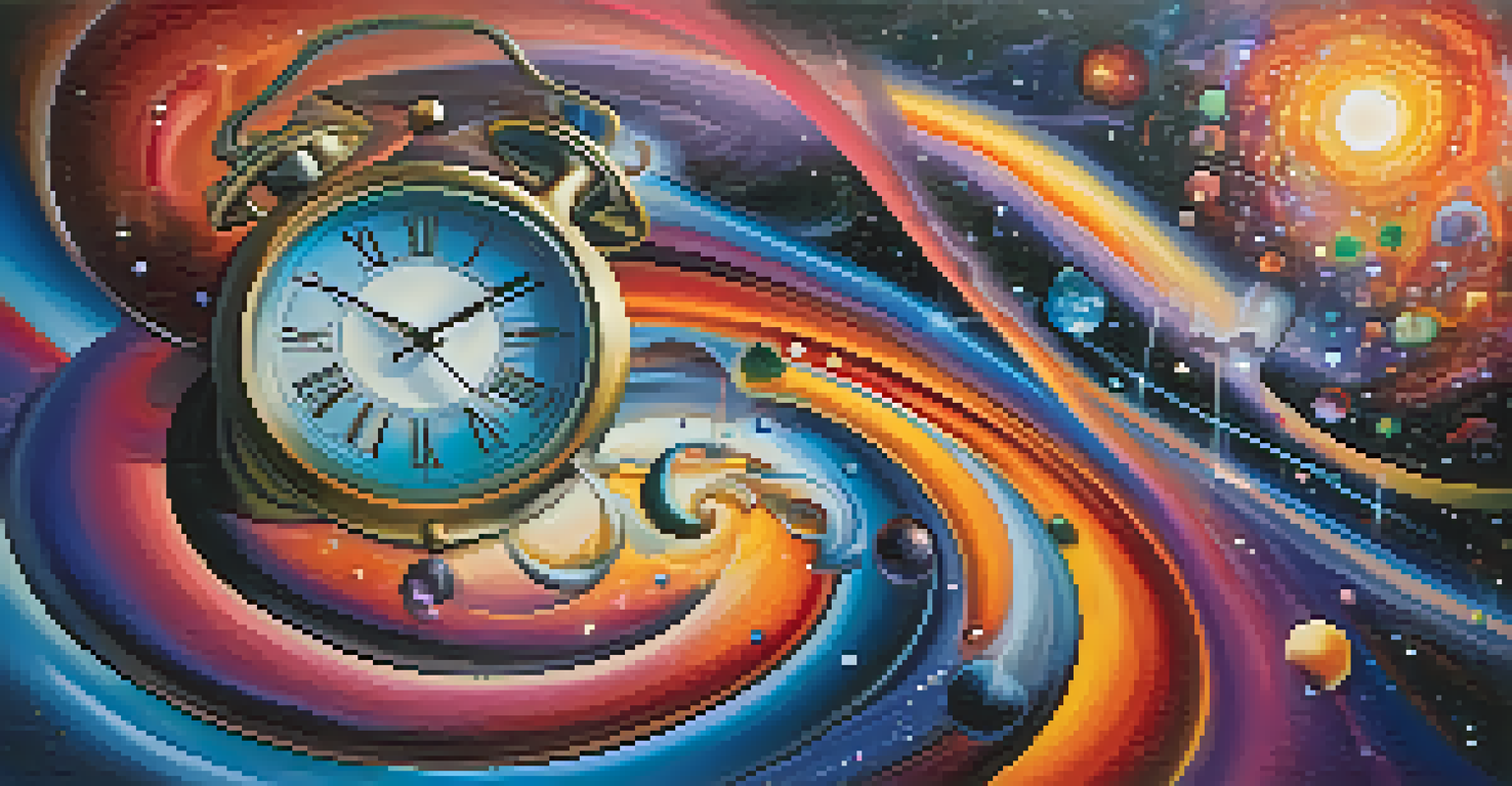The Psychological Effects of Hallucinogens on Time Experience

Understanding Hallucinogens and Their Effects
Hallucinogens are substances that significantly alter perception, mood, and cognitive processes. Common examples include LSD, psilocybin mushrooms, and DMT. These substances have been used for centuries in various cultures for spiritual and therapeutic purposes, yet their effects on the mind continue to fascinate researchers.
Reality is merely an illusion, albeit a very persistent one.
One intriguing aspect of hallucinogens is their ability to distort time perception. Users often report feelings of time slowing down or speeding up, which can lead to profound insights or even confusion. Understanding how these substances manipulate our perception of time can shed light on the broader implications for consciousness.
Research indicates that hallucinogens can affect the brain's default mode network, a system that plays a crucial role in self-awareness and time perception. This disruption might explain the unique experiences users report, making it a vital area of study for psychologists and neuroscientists.
The Science of Time Perception
Time perception is an intricate cognitive process that allows us to experience the passage of time. It involves various brain regions and is influenced by factors like attention, emotions, and memory. When we engage in enjoyable activities, for instance, time often seems to fly by, while boring tasks can drag on.

Hallucinogens can disrupt this natural flow by altering how we process sensory information. For instance, during a psychedelic experience, users might feel as if minutes have stretched into hours. This phenomenon offers a unique opportunity to explore the malleable nature of time in our consciousness.
Hallucinogens Alter Time Perception
These substances can distort users' sense of time, leading to unique experiences and insights.
Understanding the science behind time perception not only enhances our knowledge of hallucinogens but also offers insights into everyday experiences. By studying these altered states, researchers can better comprehend how our brains construct the reality of time.
Personal Accounts: Time Dilation Experiences
Many individuals who have experimented with hallucinogens share strikingly similar experiences regarding time. For instance, some describe a sensation of being in multiple timelines or dimensions simultaneously, which profoundly alters their understanding of existence. These personal anecdotes provide a window into the subjective nature of time.
The greatest illusion is that we have time.
One common theme is the feeling of timelessness, where users report a sense of eternity during their trips. This can lead to deep reflections on life and existence, often resulting in a changed perspective long after the experience has ended. Such narratives highlight how hallucinogens can foster personal growth.
These accounts not only enrich our understanding of time perception but also emphasize the transformative potential of hallucinogens. By examining these personal stories, we can better appreciate how altered states of consciousness can reshape our views on time and reality.
Cognitive Mechanisms Behind Time Distortion
The cognitive mechanisms that underlie time distortion during hallucinogenic experiences are complex and not yet fully understood. One hypothesis suggests that these substances may enhance sensory input, making moments feel more vivid and elongated. This heightened perception could trick the brain into perceiving time differently.
Additionally, altered states of consciousness can lead to a breakdown of the usual temporal markers we rely on, such as external stimuli and internal clocks. As users immerse themselves in the experience, their focus shifts, which may contribute to a disorientation of time.
Cultural Views Shape Time Experiences
Different cultures interpret time and hallucinogens in distinct ways, influencing their spiritual practices and understanding of existence.
By examining these cognitive mechanisms, researchers hope to uncover how hallucinogens may unlock new ways of thinking about time and perception, potentially influencing therapeutic practices and our broader understanding of consciousness.
Cultural Perspectives on Time and Hallucinogens
Throughout history, various cultures have utilized hallucinogens in rituals and spiritual practices, often with a distinct understanding of time. Indigenous peoples, for example, might view time as cyclical, where past, present, and future coexist. This perspective can be profoundly influenced by their experiences with these substances.
In many cultures, hallucinogens are believed to connect users with the divine or the universe, creating a sense of timelessness. These experiences often reinforce cultural narratives about existence and the nature of reality, illustrating the deep ties between spirituality and time perception.
Exploring these cultural perspectives not only enriches our understanding of hallucinogens but also highlights the importance of context in shaping our experiences of time. By acknowledging these diverse views, we can gain a more comprehensive understanding of the psychological effects of hallucinogens.
Potential Therapeutic Applications of Hallucinogens
Recent studies have indicated that hallucinogens may have therapeutic potential, particularly in treating mental health conditions. For instance, they have shown promise in alleviating symptoms of anxiety, depression, and PTSD. The unique effects on time perception could be a significant factor in these therapeutic outcomes.
By altering the way individuals perceive time, hallucinogens might help patients process traumatic memories or gain new perspectives on their lives. This can lead to breakthroughs in therapy that traditional methods may not achieve, opening doors for innovative treatment options.
Therapeutic Potential of Hallucinogens
Research suggests that hallucinogens may aid in treating mental health issues by altering time perception and facilitating personal breakthroughs.
As research continues to evolve, understanding the relationship between hallucinogens and time perception can pave the way for groundbreaking therapeutic practices. This intersection of psychology and pharmacology offers hope for those seeking relief from mental health struggles.
The Future of Research on Hallucinogens and Time
As the stigma surrounding hallucinogens begins to fade, researchers are increasingly interested in studying their effects, particularly on time perception. The growing body of evidence suggests that these substances could offer valuable insights into the nature of consciousness and the human experience of time.
Future studies may explore not only the psychological effects of hallucinogens but also their potential applications in mental health treatment and personal development. Understanding how these substances influence time perception can lead to new frameworks for interpreting human cognition.

In conclusion, the future of research in this field holds great promise. By delving deeper into the psychological effects of hallucinogens, we can uncover new ways to enhance our understanding of time, consciousness, and the complexities of the human mind.